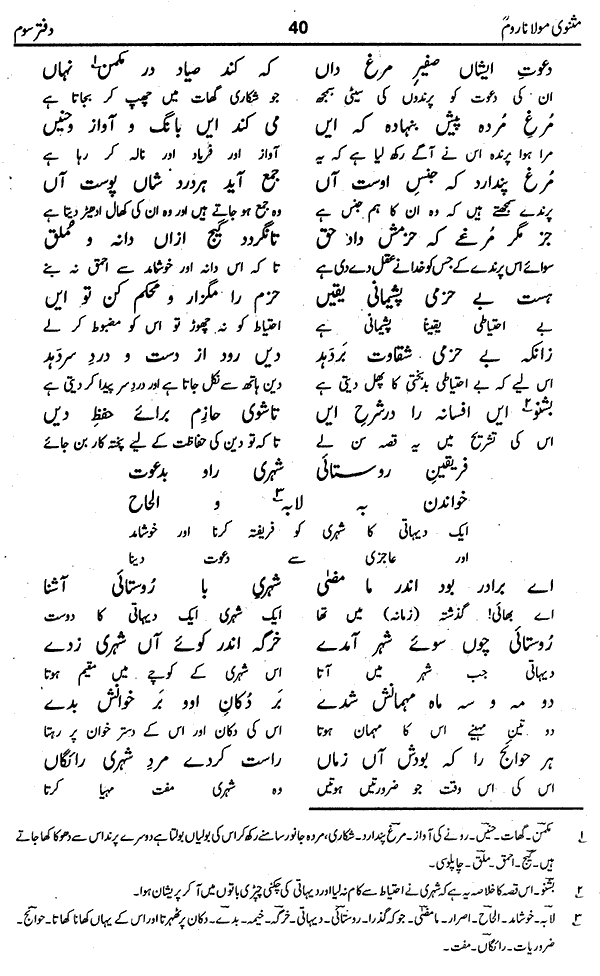How the countryman deceived the townsman and invited him with humble entreaties and great importunity.
In the past, O brother, there was a townsman (who was) intimate with a countryman.
Whenever the countryman came to town, he would pitch his tent in the street of the townsman. He would be his guest for two or three months, he would be in his shop and at his table,
And the townsman would provide, free of cost, everything that he wanted during that time.
Bring all your children, (I beg you) in God's name, for this is the time of the rose-garden and the springtide;
Or come in summer, in the fruit-season, that I may brace my belt to do you service.
Bring your retinue and your children and kinsfolk, and stay in our village three or four months, For in spring the countryside is pleasant; there are sown fields and lovely anemones.”
Every year he (the countryman) would say, “When will you set out on the journey?—for the month of December is (already) come,”
And he (the townsman) would make an excuse, saying, “This year we have a guest who has come from such and such a district;
(But) next year I will run (down) to that part (of the country), if I can escape from the pressing
affairs (which keep me at home).”
He (the countryman) said, “My family are (anxiously) expecting your children, O benefactor.”
On the last occasion, that paladin set dishes (of food) before him at morn and eve for three months.
From shame he again said to the Khwája, “How long (nothing but) promises? How long will you
deceive me?”
The Khwája said, “My body and soul are eager for the meeting, but every change depends on the decree of Him (God).
Once more he (the countryman) adjured him, crying, “O generous man, take your children and come and behold the pleasures (of the country).”
He took his hand three times in covenant, saying, “In God's name, come quickly, make the utmost effort!”
After ten years—and every year the same sugared entreaties and promises—
The Khwája's children said, “O father, the moon and the clouds and the shadows too have their journeys.
He gave us many injunctions in secret: ‘Bring him to the country,’ said he, ‘coaxing (him to come).’”
He (the townsman) said, “This is true, but, O Síbawayh, be on your guard against the malice of him to whom you have shown kindness.
Love is the seed (that bears fruit at the moment) of the last breath: I fear that it may be corrupted by estrangement.”
There is a friendship like the season of spring, whence (come) restorations and produce incalculable.
Prudence is this, that you think evil, so that you may flee and become quit of evil.
The Prophet has said, “Prudence is (consists in) thinking evil”: know that for every footstep there is a snare, O fool!
The surface of the plateau is level and broad, (but at) every step there is a snare: do not advance boldly.
O you who saidst “Where?” look and see! You sawest the plain, (but) you didst not see the ambush.
Without ambush and snare and hunter, O cunning one, how should there be a sheep's tail (laid in a trap) amidst the cornfield?
They that came along boldly on the earth—see their bones and skulls!
When you go to the graveyard, O you with whom God is pleased, ask their bones concerning that which is past,
If you have eyes, do not walk blindly; and if you have not eyes, take a staff in your hand. When you have not the staff of prudence and judgement, make the (seer's) eye your leader; And if there is no staff of prudence and judgement, do not stand on every road without a guide.
Step in the same fashion as a blind man steps, in order that your foot may escape from the pit and the dog.
O you who have jumped away from some smoke and fallen into a fire, you who have sought a
mouthful (of food) and become a mouthful for a snake,





No comments:
Post a Comment